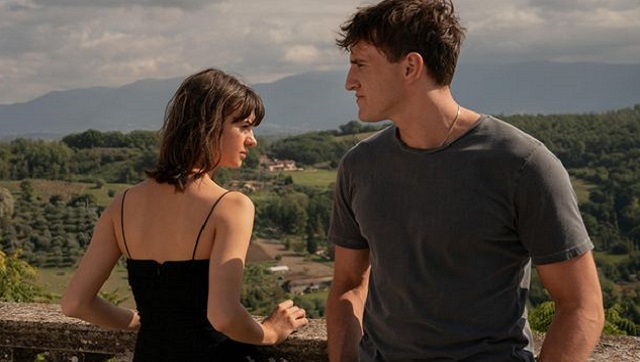Language: English The most ’normal’ trait of Normal People, Hulu’s adaptation of Sally Rooney’s 2018 eponymous novel, is its association of romance with rebellion. Every love story ever told is rebellious in nature since the union of two individuals often stands against the tides of social constructs like class and religion. Normal People begins as a teenage romance between a rich girl and a relatively less well-off guy, but rebels against such template from the onset. Marianne (Daisy Edgar-Jones) is the wealthy outcast in school, where a group of less economically privileged classmates bully her because she mostly keeps to herself. Remarks like ‘ugly flat-chest b*tch’ get to her because of self-esteem issues and a troubled family background. Connell (Paul Mescal) has a soft corner for her. His mother Lorraine (the unstoppable Sarah Greene) works as domestic help at Marianne’s place. While he is part of the bully gang, he never participates in their targeted verbal assaults.
falling in love sleeping with each other. For love is miles, and literally years, away. Their relationship traverses countless breakups and hook-ups, detours in other dating partners, cities (Sligo, their hometown, and Dublin, where they attend university, and a couple of towns in Italy), and a string of personal experiences of trauma. Rebellion comes in different shapes and sizes.
What started as a latent rebellion against society that may judge them evolves into a desperate rebellion against the other, and a helpless rebellion against the self.
These rebellions form the contours, the crests and troughs, in the screenplay by Rooney, Alice Birch (11 episodes), and Mark O’ Rowe (one episode). The ’twists’ run the risk of feeling imposed for the sake of manufactured turbulence in what could have been a smooth relationship. But courtesy deeply felt performances by the leads and their unwavering chemistry, the inflection points feel earned despite there being too many. Physical intimacy precedes emotional in every episode as both Marianne and Connell are more equipped to bare their bodies than their hearts to each other. The lovemaking scenes reflect the fragile bond they share, as well as the messiness they cannot help but relish in after days of pent-up desire. The paradoxical mix of chaos and tenderness in bed is caused by their unmitigated eagerness to find themselves in each other. There is more climax than foreplay. But even when the sex is tense, it is always an ice-breaker. Once the point of satiation arrives, the lust for ambition and fear of attachment kick in, and the two begin finding faults in each other’s choices.
To reduce their complex romance to millennial surface-level is unfair, just like it is to boil their differences down to class.
Grave issues like domestic abuse, parental discord, sibling violence, and panic attacks triggered by suicide find a space here. They are treated with the required sensitivity, and not just used as woke check boxes to justify millennial insecurities. But I have to admit — to have our heavenly-looking protagonists go through the drill of making wrong choices one after the other and delay ‘falling in love’ does get exhausting. The mini-series extends for 12 episodes of 30 minutes each, and it could have easily been trimmed down to a little over half the runtime. The vertical layering does not sit well with the horizontal stretching. It becomes too much to take in for too long. Yes, the idea may be that life is not simple and love is elusive; but when the narrative goes in rounds, the fatigue becomes overbearing. At a time when one is expected to root for the protagonists, one conveniently plays a drinking game: will they (have sex), won’t they.
All images from Twitter.
Twitter handle - @inkedinwhite
)